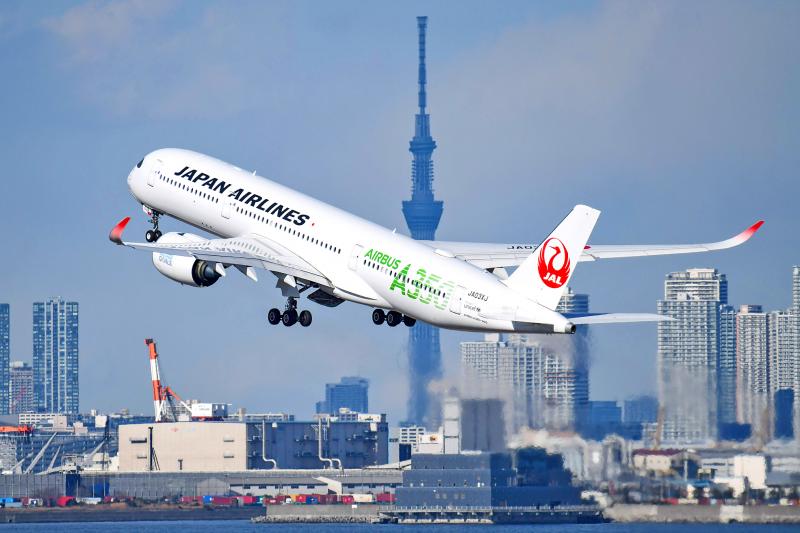Japan Airlines Co (JAL) expects a worse loss this fiscal year than previously forecast as the COVID-19 pandemic wreaks havoc on international demand for travel.
The nation’s flag carrier is now forecasting a net loss of ¥300 billion (US$2.9 billion) for the 12 months ending on March 31 and sales of ¥460 billion, according to an exchange filing yesterday.
For the third quarter, JAL reported a net loss of ¥51.5 billion, wider than the ¥36.9 billion estimated by analysts. Sales for the period were ¥161.8 billion versus the ¥170 billion forecast.

Photo: AFP
Airlines in Japan are facing a grim outlook as COVID-19 cases rise and the nation extends its state of emergency. Surging virus numbers in Asia’s second-biggest economy could have limited JAL’s traffic in the third quarter of last year to just 27 percent of pre-pandemic levels, Bloomberg Intelligence analysts said last month.
Japan is also still yet to reach a conclusion on whether to go ahead with the Olympics later this year.
While Thomas Bach, president of the International Olympic Committee, and the Japanese government are pledging to forge ahead, a Japan Broadcasting Corp poll showed that almost 80 percent of people think the Games should be canceled or postponed.
The nation’s other big airline, ANA Holdings Inc, on Friday reported a quarterly operating loss that was slightly narrower than analysts’ estimates. ANA’s pledge to get back into the black next fiscal year looks challenging considering the pandemic shows no sign of abating.
Separately, Ryanair Holdings PLC said it is betting on a rapid rollout of coronavirus vaccines to deliver a late-summer travel surge after forecasting losses of up to 950 million euros (US$1.1 billion) in the year through next month.
While a resurgence of COVID-19 cases in Europe means Easter is “essentially a writeoff,” the passenger tally might recover to 50 to 70 percent of normal levels in the peak months of July, August and September as more people get the jab, chief executive officer Michael O’Leary said in an interview yesterday.
“You’re going to see a dramatically accelerated rate of vaccination across the European Union,” O’Leary said. “That’s the point where we are released from these restrictions. Short-haul travel will recover strongly and quickly. There is huge suppressed travel demand in Europe.”
Europe’s biggest discount airline expects to carry as few as 26 million people in the current 12 months compared with 149 million in fiscal 2020 as the emergence of new coronavirus variants drives further spikes in case numbers.
Governments have responded with tougher rules and told citizens that it is premature to book summer holidays.

Taiwan Transport and Storage Corp (TTS, 台灣通運倉儲) yesterday unveiled its first electric tractor unit — manufactured by Volvo Trucks — in a ceremony in Taipei, and said the unit would soon be used to transport cement produced by Taiwan Cement Corp (TCC, 台灣水泥). Both TTS and TCC belong to TCC International Holdings Ltd (台泥國際集團). With the electric tractor unit, the Taipei-based cement firm would become the first in Taiwan to use electric vehicles to transport construction materials. TTS chairman Koo Kung-yi (辜公怡), Volvo Trucks vice president of sales and marketing Johan Selven, TCC president Roman Cheng (程耀輝) and Taikoo Motors Group

Among the rows of vibrators, rubber torsos and leather harnesses at a Chinese sex toys exhibition in Shanghai this weekend, the beginnings of an artificial intelligence (AI)-driven shift in the industry quietly pulsed. China manufactures about 70 percent of the world’s sex toys, most of it the “hardware” on display at the fair — whether that be technicolor tentacled dildos or hyper-realistic personalized silicone dolls. Yet smart toys have been rising in popularity for some time. Many major European and US brands already offer tech-enhanced products that can enable long-distance love, monitor well-being and even bring people one step closer to

RECORD-BREAKING: TSMC’s net profit last quarter beat market expectations by expanding 8.9% and it was the best first-quarter profit in the chipmaker’s history Taiwan Semiconductor Manufacturing Co (TSMC, 台積電), which counts Nvidia Corp as a key customer, yesterday said that artificial intelligence (AI) server chip revenue is set to more than double this year from last year amid rising demand. The chipmaker expects the growth momentum to continue in the next five years with an annual compound growth rate of 50 percent, TSMC chief executive officer C.C. Wei (魏哲家) told investors yesterday. By 2028, AI chips’ contribution to revenue would climb to about 20 percent from a percentage in the low teens, Wei said. “Almost all the AI innovators are working with TSMC to address the

Malaysia’s leader yesterday announced plans to build a massive semiconductor design park, aiming to boost the Southeast Asian nation’s role in the global chip industry. A prominent player in the semiconductor industry for decades, Malaysia accounts for an estimated 13 percent of global back-end manufacturing, according to German tech giant Bosch. Now it wants to go beyond production and emerge as a chip design powerhouse too, Malaysian Prime Minister Anwar Ibrahim said. “I am pleased to announce the largest IC (integrated circuit) Design Park in Southeast Asia, that will house world-class anchor tenants and collaborate with global companies such as Arm [Holdings PLC],”